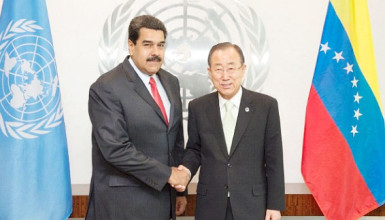Venezuela’s President Nicolas Maduro yesterday said he had asked U.N. Secretary-General Ban Ki-moon for U.N. mediation in his country’s century-old border controversy with Guyana, Reuters reported.
His request follows an international campaign mounted by the Granger administration to expose a maritime decree issued by Venezuela on May 26, 2015 seeking to swallow up a large portion of Guyana’s Atlantic sea front.
That decree, which has now been superseded by a less offensive one, has seen strong statements by President David Granger in Parliament, at a recent Caricom Heads of Government summit in Barbados, at a gathering of Mercosur leaders in Brazil and at the William J. Perry Center for Hemispheric Defense Studies in the US decrying Venezuelan aggression against Guyana.
Reuters said that the controversy over the Essequibo was discussed by Maduro and Ban at a meeting yesterday morning in New York.

“We will continue to work through diplomatic means,” Maduro told reporters after the meeting. “We will overcome the provocations and aggressions of Granger.”
The controversy roared back to life in May after an offshore oil discovery by ExxonMobil Corp in Guyana’s waters. Prior to the discovery Venezuelan Foreign Minister Delcy Rodrigues had written to Exxon several times objecting to the exploration. Days after Exxon’s announcement of a significant oil find in Guyana’s waters Maduro issued the offending decree on May 26th, also Guyana’s anniversary of independence. Venezuela has long sought to obstruct efforts by Guyana to discover oil.
Under swingeing pressure from Guyana and following a statement on July 5th from Caricom Heads calling on Caracas to adjust its decree, Venezuela issued an amended one on July 6th dropping all geographic coordinates. Guyana is still unhappy with this decree as it refers to a defence zone in Guyana’s Atlantic waters.
After the May 26th decree, Guyana had declared that Venezuela had essentially ended the quest for a settlement of the controversy under the auspices of the United Nations and that Guyana would now move for a juridical settlement. This sentiment was conveyed by President Granger to the UN Secretary General when the two met on the sidelines of the Caricom summit in Barbados. Guyana has also formally written to the UN Secretary General on this.
Venezuela is still pressing for the appointment of a new Good Officer despite Guyana’s opposition. The UN Secretary General has said that he will dispatch missions to both countries to determine the way ahead.
On the same day on which the July 6th decree was issued, Maduro addressed the country’s legislature and announced that Caracas’ envoy here was being recalled for consultations and relations with Guyana would be reviewed. He had also accused Granger of unacceptable language against Venezuela.
Georgetown has said that the Decree of May 26 was a “baseless and shameless” bid to usurp Guyana’s territory and a “flagrant violation” of international law.
In his inaugural address to Caricom Heads at the summit Granger had underlined the threat that the maritime decree posed to the rest of the region and had accused Venezuela of aggression against Guyana.
“We have already demonstrated the capacity to collaborate to confront some of the most challenging transnational threats. These threats have demanded that we increasingly seek regional rather than purely national responses. They form the basis of regional cooperation. Transnational threats, formidable as they are, pale in significance to a much more portentous threat – the threat to our territory, the very land and sea space on which we rely for our everyday existence.
“Our exclusive economic zones are integral to our national territory. They are essential to our survival because we depend on these waters for our economic sustenance — travel, trade, tourism, fishing and petroleum exploitation.
“Our exclusive economic zones are rich in resources. These zones represent potentially lucrative economic frontiers. Many of the exclusive economic zones of our member states are interlocked. More importantly, some have not been demarcated. This absence of maritime demarcation represents a possible source of conflict within the Community. It can also be exploited from forces external to the Community”, he said in a clear reference to Caracas.
Reuters said that relations between the two nations were warm under Venezuela’s former president Hugo Chavez but cooled significantly when Maduro took power in 2013.
Critics of Maduro say Venezuela’s high inflation, crime and his low approval ratings have led him to use Guyana as a distraction.





